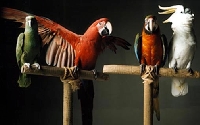
Here’s how to care for parrots to keep both you and your bird happy and healthy
Having owned a cockatoo and parakeets and bred and raised many cockatiels, I can attest to the fact that parrots and people make great pals. Parrots are beautiful and intelligent creatures that can become fun members of your household, but they do require some special attention.
Learn how to care for parrots before you decide what kind to get and you’ll ensure that both you and your pet will be happy.
The size of your parrot will determine the size of the cage you need. For safety, stainless steel cages and wrought iron cages are best. The cage should be big enough for the bird to spread both of its wings without catching them on anything. There should also be plenty of room for the parrot to climb around on both perches and the cages bars, since exercise is important for your bird?s health.
Cleanliness is also important for keeping your parrot in good shape. Many cages have removable bottoms to allow easy access for replacing the paper every two or three days. A big door will help when you need to clean the bars, scrape the perches and disinfect or replace your bird’s toys.
~
Locate the cage in an area where it’s easy to clean around it because seeds and feathers have a way of ending up on the floor. Also, consider putting the cage against a wall – it will give your bird a sense of security. provide some warmth and protect it from drafts. Finally, make sure the cage is as far away from the kitchen as possible – smoke and cooking odors can be deadly to birds.
In the wild, parrots eat a wide variety of foods, so a broad diet is good for your pet bird too. There are excellent pellet foods designed for specific birds and these are less messy than seeds with shells, which are good as treats. Parrots also like vegetables, both leafy and other kinds, as well as grains, beans and some fruits. Check with a reliable pet store owner, breeder or bird book for foods to avoid. Avocados, caffeine, alcohol, fried foods, chocolate and sweet or salty snacks are bad for any bird.
Parrots are both intelligent and highly social creatures. When one comes into your home, you become its flock. To be a good flock member means you should play with your parrot daily and teach it to talk and do simple tricks. There are excellent books and videos available to help you teach your bird quickly and easily. When you’re not around, make sure your parrot has plenty to keep it occupied by providing it with safe and entertaining toys.
To keep your parrot healthy, learn to trim its feathers, claws and beak, or take it to a vet or bird groomer. Give your bird frequent baths with a water mister to help it clean itself. Find a reputable avian veterinarian and get on a regular schedule. Know where the nearest animal emergency clinic is and make sure they treat birds. Finally, consider joining a bird club so you can meet and share experiences with other owners ? you?ll find out that parrot owners like to talk as much as their birds do.
Parrots are long-lived creatures – many species can live over 50 years. Learn how to care for your parrot and it will reward you with fun, companionship and even conversation for a long time.

